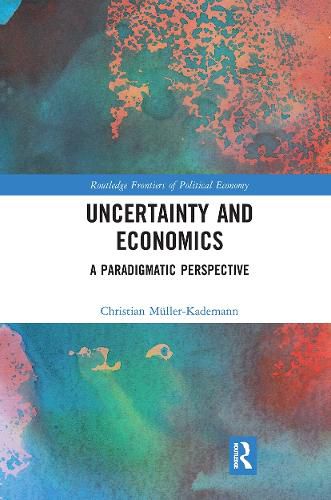Readings Newsletter
Become a Readings Member to make your shopping experience even easier.
Sign in or sign up for free!
You’re not far away from qualifying for FREE standard shipping within Australia
You’ve qualified for FREE standard shipping within Australia
The cart is loading…






This book is set against the assumption that humans’ unique feature is their infinite creativity, their ability to reflect on their deeds and to control their actions. These skills give rise to genuine uncertainty in society and hence in the economy. Here, the author sets out that uncertainty must take centre stage in all analyses of human decision making and therefore in economics.
Uncertainty and Economics carefully defines a taxonomy of uncertainty and argues that it is only uncertainty in its most radical form which matters to economics. It shows that uncertainty is a powerful concept that not only helps to resolve long-standing economic puzzles but also unveils serious contradictions within current, popular economic approaches. It argues that neoclassical, real business cycle, or new-Keynesian economics must be understood as only one way to circumvent the analytical challenges posed by uncertainty. Instead, embracing uncertainty offers a new analytical paradigm which, in this book, is applied to standard economic topics such as institutions, money, the Lucas critique, fiscal policy and asset pricing.
Through applying a concise uncertainty paradigm, the book sheds new light on human decision making at large. Offering policy conclusions and recommendations for further theoretical and applied research, it will be of great interest to postgraduate students, academics and policy makers.
$9.00 standard shipping within Australia
FREE standard shipping within Australia for orders over $100.00
Express & International shipping calculated at checkout
This book is set against the assumption that humans’ unique feature is their infinite creativity, their ability to reflect on their deeds and to control their actions. These skills give rise to genuine uncertainty in society and hence in the economy. Here, the author sets out that uncertainty must take centre stage in all analyses of human decision making and therefore in economics.
Uncertainty and Economics carefully defines a taxonomy of uncertainty and argues that it is only uncertainty in its most radical form which matters to economics. It shows that uncertainty is a powerful concept that not only helps to resolve long-standing economic puzzles but also unveils serious contradictions within current, popular economic approaches. It argues that neoclassical, real business cycle, or new-Keynesian economics must be understood as only one way to circumvent the analytical challenges posed by uncertainty. Instead, embracing uncertainty offers a new analytical paradigm which, in this book, is applied to standard economic topics such as institutions, money, the Lucas critique, fiscal policy and asset pricing.
Through applying a concise uncertainty paradigm, the book sheds new light on human decision making at large. Offering policy conclusions and recommendations for further theoretical and applied research, it will be of great interest to postgraduate students, academics and policy makers.